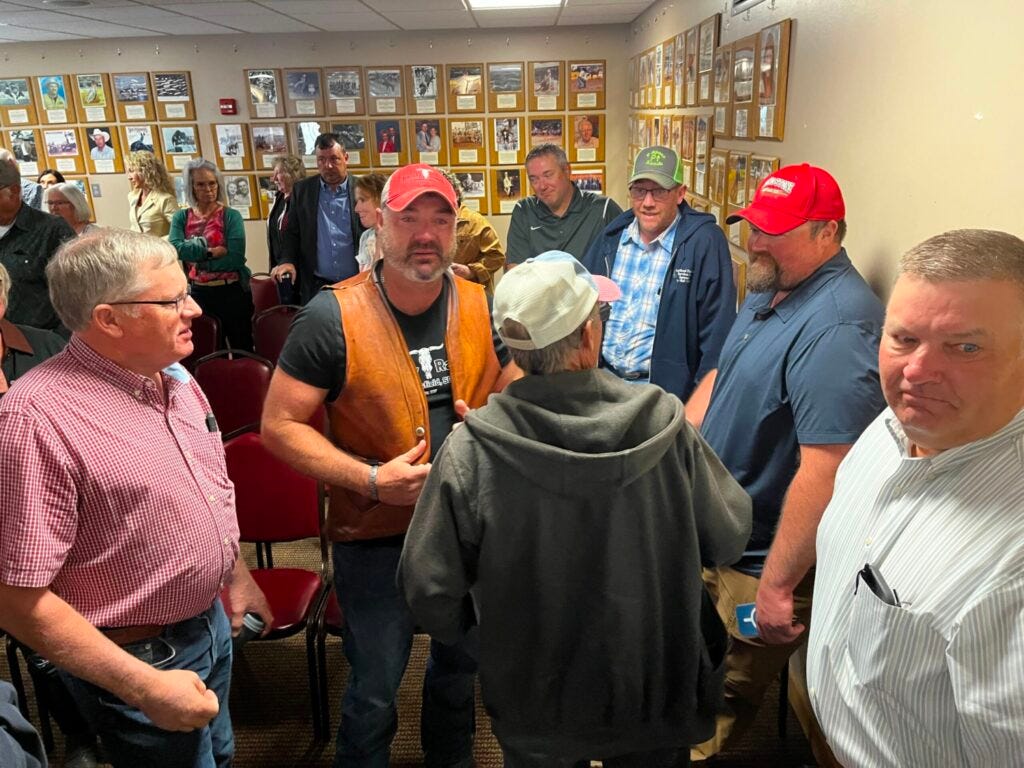Carbon Pipeline Update
Two bureaucratic setbacks in the Dakotas have left Summit Carbon Solutions on the ropes, at least in the short term.
What’s the most evil company that you remember from the movies of your childhood? I can make a strong argument for BiffCo, founded by Marty McFly’s nemesis Biff Tannen in Back To The Future II. Biff’s rise to power occurred in 1955 when, thanks to the DeLorean time machine, he gets his hands on a 2015 almanac. His subsequent 100% success rate in sports betting propels him to become the world’s richest man. Biff uses his immense wealth to create the eponymous BiffCo, then turns Marty’s bucolic hometown into a dystopian nightmare complete with casinos, toxic dioxin factories and ‘Biff Tannen’s Pleasure Paradise”.
In the movie, Marty and his futuristic skateboard ultimately prevail over the dastardly Biff. Here in the real world, Midwestern farmers are fighting their own battle with another cartoonishly evil company.
Iowa-based Summit Carbon Solutions wants to build a $5.5 billion carbon capture pipeline that will transport liquefied carbon dioxide from Midwestern ethanol plants to an undetermined location in North Dakota, where a variety of oil fracking companies need that CO2 to assist in a process called Enhanced Oil Recovery (EOR). Of course Summit never mentions their intended customers – instead their marketing centers on easily debunked claims about ‘protecting the ethanol industry’.
Summit’s owners and executives, a political dream team of former Iowa governors and their offspring, stand to make billions in federal tax credits if they succeed in building their pipeline. Their likely exit strategy, a multi-billion dollar sale to a petroleum company, is just the cherry on top of this enormous ice cream sundae. It’s a genius plan that anyone can admire – that is, unless you are one of the thousands of landowners in the intended path of Summit’s pipeline. Summit has no interest in sharing revenue or making royalty payments to affected farmers – instead, the company intends to force anyone who refuses their request for easement rights into compliance by pursuing eminent domain judgment against them.
I wrote a longer article about Summit last month (“The Rich Men of Des Moines”) which captured a lot of attention. A condensed version was published as an op-ed in the Des Moines Register and I was interviewed by 1040 WHO AM radio’s Simon Conway, who hosts Iowa’s most popular conservative daily radio show. Quite a few new developments have hit the newswires in recent days, so here’s a quick summary.
Earlier today, in a significant setback for Summit, South Dakota’s Public Utilities Commission (PUC) denied the company’s application to build its pipeline in the state. Coupled with the defeat that the company sustained last week, when North Dakota also rejected its application to build, it now appears that Summit’s plans are on the ropes – at least in the short-term.

In Iowa, where the statehouse politics are quite a bit murkier, the Iowa Utilities Board (IUB) is still reviewing Summit’s permit application, in a series of hearings that are expected to last at least six weeks. I have spoken to several people who have been in attendance.
The IUB’s actions indicate that they want to make this process as unpleasant as they possibly can for Summit’s opponents. They have enacted draconian rules on attendees, who are not allowed to bring in their own bottled water and are forbidden from speaking to each other in the facility or even from standing up. Security is on par with what you might expect at an Israeli-PLO summit, and the IUB has retained a contracted security firm called Overwatch to enforce its rules. Several people have attested to seeing Overwatch employees photographing vehicle license plates of attendees, and at least one opposing lawyer’s vehicle has been towed from the building parking lot and impounded.
Given Summit’s deep political connections in Iowa (former Gov Terry Branstad is an advisor, and founder Bruce Rastetter was the current governor’s largest single political donor) many pipeline opponents expect the IUB process to be a ‘rubber stamp’. This stands in stark contrast to the process that we just saw play out in South Dakota, where local residents were particularly incensed after Summit pointedly obtained court approval to walk onto the land owned by a farmer who was one of the pipeline’s loudest critics. That farmer, Jared Bossly, was quoted today as saying “I’ve felt like there was a tractor on my chest, and that weight has finally been removed.”
Given the massive financial stakes at risk, it is extremely unlikely that Summit will give up its plans even after today’s procedural defeat. The company’s political assets in Pierre and Bismarck are likely working long hours to overcome recent setbacks in the Dakotas. In Iowa, where it is doubtful that anyone ever heard of the Utilities Board until very recently, the stakes are suddenly very high. I will continue to monitor the situation and keep readers informed here.


